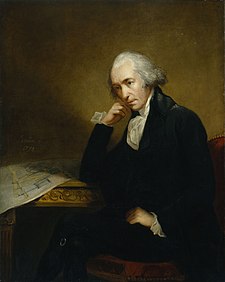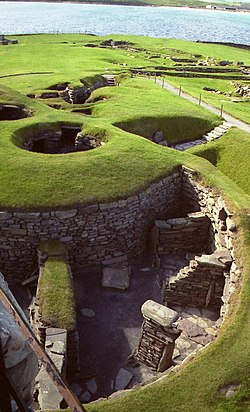Portal:Scotland
| Main Page | Selected articles 1 | Selected articles 2 | Selected biographies | Selected quotes | Selected pictures | Featured Content | Categories & Topics |
Introduction
 |

|
|

| ||
Scotland (Scots: Scotland; Scottish Gaelic: Alba) is a country that is part of the United Kingdom. It contains nearly one-third of the United Kingdom's land area, consisting of the northern part of the island of Great Britain and more than 790 adjacent islands, principally in the archipelagos of the Hebrides and the Northern Isles. To the south-east, Scotland has its only land border, which is 96 miles (154 km) long and shared with England; the country is surrounded by the Atlantic Ocean to the north and west, the North Sea to the north-east and east, and the Irish Sea to the south. The population in 2022 was 5,436,600 and accounts for 8% of the population of the UK. Edinburgh is the capital and Glasgow is the largest of the cities of Scotland.
The Kingdom of Scotland emerged in the 9th century. In 1603, James VI inherited England and Ireland, forming a personal union of the three kingdoms. On 1 May 1707 Scotland and England combined to create the new Kingdom of Great Britain, with the Parliament of Scotland subsumed into the Parliament of Great Britain. In 1999 a Scottish Parliament was re-established, and has devolved authority over many areas of domestic policy. The country has a distinct legal system, educational system, and religious history from the rest of the UK, which have all contributed to the continuation of Scottish culture and national identity. Scottish English and Scots are the most widely spoken languages in the country, existing on a dialect continuum with each other. Scottish Gaelic speakers can be found all over Scotland, however the language is largely spoken natively by communities within the Hebrides. The number of Gaelic speakers numbers less than 2% of the total population, though state-sponsored revitalisation attempts have led to a growing community of second language speakers.
The mainland of Scotland is broadly divided into three regions: the Highlands, a mountainous region in the north and north-west; the Lowlands, a flatter plain across the centre of the country; and the Southern Uplands, a hilly region along the southern border. The Highlands are the most mountainous region of the British Isles and contain its highest peak, Ben Nevis, at 4,413 feet (1,345 m). The region also contains many lakes, called lochs; the term is also applied to the many saltwater inlets along the country's deeply indented western coastline. The geography of the many islands is varied. Some, such as Mull and Skye, are noted for their mountainous terrain, while the likes of Tiree and Coll are much flatter. (Full article...)
Selected article

The flora of Scotland is an assemblage of native plant species including over 1,600 vascular plants, more than 1,500 lichens and nearly 1,000 bryophytes. The total number of vascular species is low by world standards but lichens and bryophytes are abundant and the latter form a population of global importance. Various populations of rare fern exist, although the impact of 19th-century collectors threatened the existence of several species. The flora is generally typical of the north-west European part of the Palearctic realm and prominent features of the Scottish flora include boreal Caledonian forest (much reduced from its natural extent), heather moorland and coastal machair. In addition to the native species of vascular plants there are numerous non-native introductions, now believed to make up some 43% of the species in the country.
There are a variety of important trees species and specimens; a Grand Fir in Argyll is the tallest tree in the United Kingdom and the Fortingall Yew may be the oldest tree in Europe. The Arran Whitebeams, Shetland Mouse-ear and Scottish Primrose are endemic flowering plants and there are a variety of endemic mosses and lichens. Conservation of the natural environment is well developed and various organisations play an important role in the stewardship of the country's flora. Numerous references to the country's flora appear in folklore, song and poetry.
Selected quotes
" ... Doctors, like minicab drivers, are the other idiots to whom we trust our lives ... "
" ... When shall I see Scotland again? Never shall I forget the happy days I passed there amidst odious smells, barbarous sounds, bad suppers, excellent hearts and the most enlightened and cultivated understandings ... "
In the news

- 25 April 2024 –
- The Scottish National Party's coalition in the Scottish government with the Scottish Greens collapses as the Scottish National Party withdraws, although the party announces its intention to continue as a minority government. In response, the Scottish Conservatives call a no confidence vote against First Minister Humza Yousaf. (Reuters) (BBC News)
Selected biography

James Watt FRS, FRSE (/wɒt/; 30 January 1736 (19 January 1736 OS) – 25 August 1819) was a Scottish inventor, mechanical engineer, and chemist who improved on Thomas Newcomen's 1712 Newcomen steam engine with his Watt steam engine in 1776, which was fundamental to the changes brought by the Industrial Revolution in both his native country Great Britain, and the rest of the world.
While working as an instrument maker at the University of Glasgow, Watt became interested in the technology of steam engines. At the time engineers such as John Smeaton were aware of the inefficiencies of Newcomen's engine and aimed to improve it. Watt's insight was to realize that contemporary engine designs wasted a great deal of energy by repeatedly cooling and reheating the cylinder. Watt introduced a design enhancement, the separate condenser, which avoided this waste of energy and radically improved the power, efficiency, and cost-effectiveness of steam engines. Eventually, he adapted his engine to produce rotary motion, greatly broadening its use beyond pumping water.
Watt attempted to commercialise his invention, but experienced great financial difficulties until he entered a partnership with Matthew Boulton in 1775. The new firm of Boulton and Watt was eventually highly successful and Watt became a wealthy man. In his retirement, Watt continued to develop new inventions though none was as significant as his steam engine work.
As Watt developed the concept of horsepower, the SI unit of power, the watt, was named after him.
Selected picture
Jarlshof is the best known prehistoric archaeological site in Shetland. It lies near the southern tip of the Shetland Mainland and has been described as "one of the most remarkable archaeological sites ever excavated in the British Isles".
Photo credit: Nigel Duncan
Did You Know...

- ... that Carrbridge Packhorse Bridge is the oldest-known stone bridge in the Scottish Highlands?
- ... that the Jubilate by Benjamin Britten was written in 1961 for St George's Chapel at the request of the Duke of Edinburgh, and performed there for some of his birthdays and his funeral?
- ... that Grey Gowrie, while holding office under Margaret Thatcher, described himself as "Irishman with a Scots name and a German wife, working, somewhat to his surprise, for a very English government"?
- ... that of the 16 teams to enter the inaugural Scottish Cup, only Dumbarton, Kilmarnock and Queen's Park still regularly compete in the competition?
- ... that because of violent reactions – such as Jenny Geddes's on 23 July 1637 – to a Scottish prayer book, Walter Whitford kept loaded pistols visible to his congregants while using the book?
- ... that comedian Frankie Boyle's debut novel Meantime is about a Glaswegian drug addict investigating his friend's death?
- ... that Brigadier Archie Miller-Bakewell registered the death of Prince Philip, Duke of Edinburgh?
- ... that General George Monck accepted that 500 Scots, including women and children, were killed when his army stormed Dundee in 1651?
Get involved
For editor resources and to collaborate with other editors on improving Wikipedia's Scotland-related articles, see WikiProject Scotland.
To get involved in helping to improve Wikipedia's Scotland related content, please consider doing some of the following tasks or joining one or more of the associated Wikiprojects:
- Visit the Scottish Wikipedians' notice board and help to write new Scotland-related articles, and expand and improve existing ones.
- Visit Wikipedia:WikiProject Scotland/Assessment, and help out by assessing unrated Scottish articles.
- Add the Project Banner to Scottish articles around Wikipedia.
- Participate in WikiProject Scotland's Peer Review, including responding to PR requests and nominating Scottish articles.
- Help nominate and select new content for the Scotland portal.
Do you have a question about The Scotland Portal that you can't find the answer to?
Post a question on the Talk Page or consider asking it at the Wikipedia reference desk.
Related portals
Other language versions
Associated Wikimedia
The following Wikimedia Foundation sister projects provide more on this subject:
-
Commons
Free media repository -
Wikibooks
Free textbooks and manuals -
Wikidata
Free knowledge base -
Wikinews
Free-content news -
Wikiquote
Collection of quotations -
Wikisource
Free-content library -
Wikispecies
Directory of species -
Wikiversity
Free learning tools -
Wikivoyage
Free travel guide -
Wiktionary
Dictionary and thesaurus







































